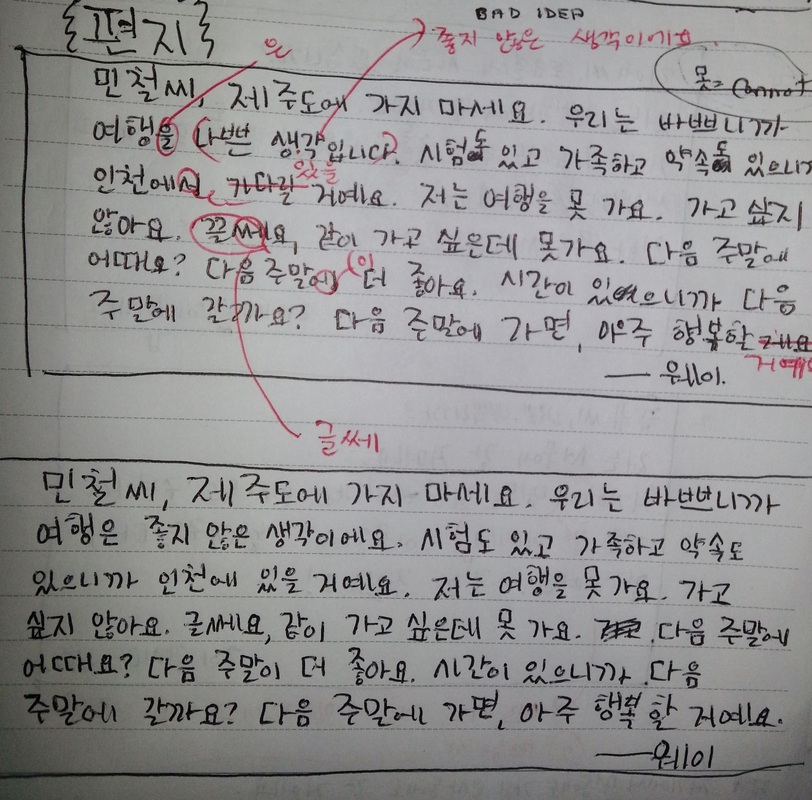민철 씨, 제주도에 가지 마세요. 우리는 바쁘니까 여행은 좋지 않은 생각이에요. 시험도 있고 가족하고 약속도 있으니까 인천에 있을 거예요. 저는 여행을 못 가요. 가고 싶지 않아요. 글쎄요, 같이 가고 싶은데 못 가요. 다음 주말에 어때요? 다음 주말이 더 좋아요. 시간이 있으니까 다음 주말에 갈까요? 다음 주말에 가면, 아주 행복할 거예요. [Signed]
[English Translation]
Dear Mincheol,
Don’t go to Jeju Island. As we are so busy, going on a trip is a bad idea. We have an exam coming up, and we have obligations to our families, so we need to (here: “will”) stay in Incheon. I can’t go. I don’t want to go. Well, actually I do want to go with you, but I can’t. How about next week? Next week is better. If you have time, why don’t we go next week instead? If we go next week, I will be very happy. [Signed]
_________________________________________________
Me: [Sent the above photo]
P.R.: ㅋㅋㅋㅋ이게뭐예요?
P.R.: 민철씨가누구입니까?ㅋㅋㅋㅋ
Me: 민철씨가 없어요 [grin] 숙제가이죠…내 “편지”가 어때요?
P.R.: ㅋㅋ아주 그럴듯한데요~?
P.R.: 민철씨와 꼭 여행을가고싶은게 느껴져요ㅋㅋ
Me: [Sent the above photo]
P.R.: Haha, what’s this?
P.R.: Who is Mr. Mincheol? Hahaha
(Whereupon I explain that Mincheol is not real and that this is an assignment for class)
P.R.: Hey it’s pretty good, isn’t it?
P.R.: It’s just that…Now I feel like *I* want to go on the trip with Mincheol. Hah!
Here is a (hypothetical) person, Mincheol, proposing going on a trip for leisure even with exams upcoming and other obligations. We can criticize Mincheol for being irresponsible, maybe, but I think the Western Mind would (in principle if not in action) more likely sympathize with Mincheol than with the writer, who seems dominated by social pressures and “sounds very Asian”. (Ironically, the writer is [of course] me, who is 100% European by ancestry albeit writing in an Asian language [Korean] and one which I don’t know well at that). Yet my letter rebuking Mincheol for the trip idea made P.R., a Korean, want to join Mincheol! The “Mincheol Life” is appealing (in this case to a highly-amused P.R.), because it is (may be) more “authentic”.
The Authentic Life. Martin Heidegger. The letter-writer’s persona is the kind which Heidegger (if I can make the grand claim of understanding him) might say leads an “inauthentic life”. The writer appeals to the “They” idea. “They say you shouldn’t do any leisure activities before an exam.” Who are “They”? There is no “They”. And yet it is everywhere. All the time. Most of what we do is controlled by the “They”. The Authentic Life, as I understand it, means escaping the clutches of this “They” (see here for more). It may or may not mean going to Jeju Island with Mincheol, though.

